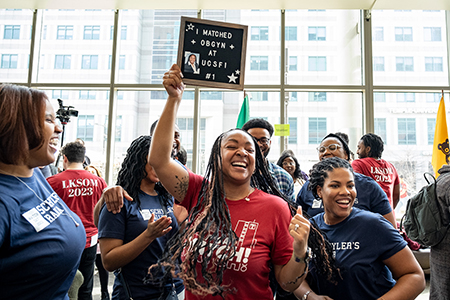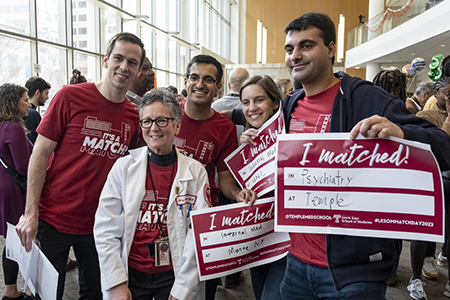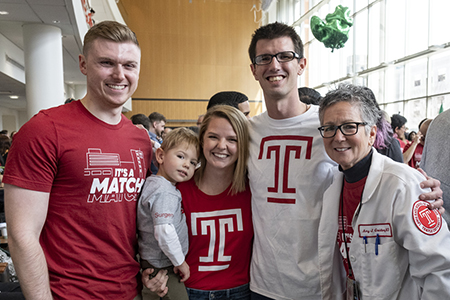“When they’re preparing you to match, no one warns you about how much time you’ll spend waiting,” says Schyler Edwards, a member of the Lewis Katz School of Medicine Class of 2023.
On Friday, March 17, the waiting concluded dramatically for Edwards and the rest of the Class of 2023 at the Lewis Katz School of Medicine. At precisely 12 PM, EST, fourth-year medical students across the country tore open envelopes containing the name and location of the residency program.
Match Day, as the occasion is known, is one of the most important days in a student’s journey to becoming a physician.
Edwards was one of them. Surrounded by a large group of family and friends, including her fiancé, who wore T-shirts they had made for the occasion, and with still more watching on a private Zoom stream, Edwards learned she’d matched with the obstetrics and gynecology residency program at the University of California San Francisco.
She targeted the program, doing a month-long rotation there earlier this academic year, because of its diversity and “commitment to maternal health equity,” specifically concerning Black women.
By the Monday after Match Day, Tim Yeung had already contacted moving companies about shipping his car and belongings to California. He’ll begin an emergency medicine residency this summer at Loma Linda University, near San Bernardino. For Yeung, it’ll be a homecoming, of sorts. His parents immigrated to Philadelphia from Hong Kong about 30 years ago. After graduating from college – his mother from Temple and his father from Drexel – they moved to Los Angeles, where Yeung was born and raised.
He enrolled in a Medical Scholars program at Washington & Jefferson College, a small liberal arts school about 30 miles south of Pittsburgh, that earned him a spot at the Katz School upon the completion of his bachelor’s degree.
As Yeung and his mother watched a large digital clock in a crowded Maurice J. Stone, MD, Commons count down to noon on Match Day, Yeung says his mother still couldn’t believe that life brought them both here, to Temple.
After a largely sleepless night, Edwin Perez, a first-generation medical student, was relieved to learn he and his partner matched with Thomas Jefferson University, he in internal medicine and she in neurology. Natives of the Miami, Florida, area, he says they applied to virtually every academic center on the East Coast, and each interviewed with more than 20 programs.
“We felt really comfortable with the interview process because we had a lot of options for matching together,” Perez says. “Being together was important to us. We realized staying in Philly was, too.”
The wait is over
The Monday before Match Day, fourth-year medical students learn if they matched, which is a relief in and of itself. But once that wears off, the last few days before they learn where they matched can feel interminable.
“It was tough. I was definitely nervous,” Yeung says. “Thursday night, I think I woke up at 4 AM and couldn’t fall back asleep.”
Edwards spent the day before with her fiancé. She says they mostly tried to distract themselves, but there were also moments when they consciously tried to reflect on all that led them to Match Day and how the contents of her envelope would forever change their lives.
At 11:50 AM on Match Day, the Class of 2023 received their envelopes. They wore cherry-colored T-shirts that said “It’s a match” in white lettering on the front. By then, the Commons was filled almost shoulder-to-shoulder with excited family and friends. Fellow students and faculty lined the second- and third-story balconies that overlook the Commons to show their support.
A few minutes before noon, Amy J. Goldberg, MD, FACS, Dean of the Lewis Katz School of Medicine, came to a podium at the center of the room.
“Remember: Wherever you match is truly where you are meant to be,” she said. “Because every school, hospital, and medical center, and every state and every city, every attending and every patient all have things to teach us on our journeys. These journeys we are all on seem to get us to where we need to be. I truly believe that.”
And then, with 10 seconds to go, virtually everyone in the room counted down together. A moment of silence, as envelopes were torn open, gave way to an eruption of joy.
The celebrations unfolded in two waves, first among the students’ inner circles. Gradually, the students began moving around the Commons, seeking out their classmates. They posed together in twos, threes, fours, and fives, holding up signs that said where they matched. Friends and family crowded in front of them for the best photo, like they were paparazzi.
Embracing the next phase, with confidence
The crowd at the Katz School began to thin out around 1 PM. Perez says he and his partner spent much of the rest of the day enjoying the company of their families, who flew in for the occasion.
“After all that anxiety, it was comforting just to have them here,” he says.
Yeung had dinner with one of his mentors, James VandenBerg, MD, MSc, Assistant Professor of Clinical Emergency Medicine at the Lewis Katz School of Medicine. Then he met up with some of his classmates afterward. Edwards had lunch with friends in Northern Liberties and dinner Friday and Saturday night with various family members.
The next phase of their medical training now in sight, they began to envision, during the quiet moments, what exactly it would look like. All three are certain they’ll be ready for it.
“Temple has prepared us, clinically, as well as any medical school in the country,” Perez says.
“I’m completely comfortable in the clinical setting,” Edwards says, “and that’s enabled me to feel, both here at Temple and at my away rotation, like I could really step up and be a member of the team. Even though I can’t officially put in and sign orders, I can still contribute my thoughts. And they’ll be valued because of my experience and education at Temple.”
“When I was on my away rotations, the faculty I worked with were quite impressed with my procedural skills and clinical reasoning,” Yeung says. “Temple has also helped me remember we’re working with human beings, not just diagnoses. They’re coming to us because they need our help. There’s a lot of meaning in that for me. It’s a big part of what drew me to emergency medicine.”
